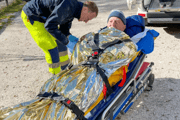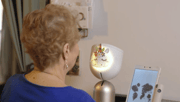Dementia Surpasses Coronary Heart Disease as Leading Cause of Premature Death - Here's What You Can Do to Prevent It
By
- Replies 2
As we age, our bodies go through a natural process of wear and tear, making us more susceptible to illnesses and physical limitations.
The gradual decline in health and well-being can not only impact an individual's physical abilities but can also affect their mental and emotional states.
Regrettably, dementia has emerged as a significant contributor to the decline in the health and well-being.
The Australian Institute of Health and Welfare has recently released data regarding dementia in the country. The statistics are alarming and show that the number of Australians living with this condition has reached 401,000, with one in 12 individuals over the age of 65 affected.
This has resulted in direct expenditure of $3 billion on health and aged care services in 2018-19 and 25,500 hospitalisations reported in 2020-21.
Even more alarming is the significant increase in the number of healthy years lost to dementia, which has surged by over 60% in the last decade, overtaking coronary heart disease as the primary cause of premature death.
As a result, dementia now stands as the second leading cause of death in Australia in 2020.

‘Alzheimer's disease and other dementias are increasingly common because our population is becoming older,’ said Associate Professor Michael Woodward, the Director of Aged Care Research at Austin Health and a medical advisor to Dementia Australia.
Dr Woodward is not surprised by the Australian Institute of Health and Welfare's recent data, which predicts a doubling in the number of people living with dementia over the next 35 years.
‘What we have to take from these figures is we need to be better prepared, we need to have a better understanding of what causes dementia, better risk reduction strategies, and better ways of preventing dementia,’ Dr Woodward stressed.
Additionally, he stressed that the increasing prevalence of dementia would likely place a significant burden on the already stretched healthcare system.
He remarked: ‘We're going to see an increasing number of people interacting with health care and residential aged care.’
‘We need to understand the effect this has on everybody; family, friends, paid carers and society. So, we need better approaches.’
Mithrani De Abrew, a 71-year-old woman from Melbourne, is all too familiar with this growing trend. She noticed a decline in her health and mobility after stumbling several times on her regular walks.
She shared: ‘I thought, this is not normal.’
‘So, I made an appointment to see my primary physician.’
Following a series of tests, her doctor identified signs of the condition and referred the 71-year-old patient to undergo additional brain scans to determine the specific type of dementia she was experiencing.
Ms De Abrew also recalled how her symptoms escalated during the assessments, claiming that she began experiencing hallucinations and perceiving sights and sounds that were not present in reality.
She said: ‘I once saw my bedroom wall like a canvas, it was moving. I even touched it to see if it was moving.’
Brain scans eventually revealed that Mithrani had several types of dementia known as Vascular Lewy and Parkinsonism, which caused her to experience delusions and disabilities.
For many older Australians, there is a glimmer of hope in the face of conditions like dementia, as advancements in diagnosis and treatment offer possibilities for improved outcomes.
As a result, individuals like Mithrani may still be able to engage in hobbies like reading.
'I still love reading, but I can only read a few words with a picture,' she said.
Keeping this in mind, experts have highlighted that although dementia is a natural part of ageing, various risk factors can be minimised to reduce the likelihood of developing neurological disorders.
These risk factors include chronic illnesses such as heart disease and diabetes, physical inactivity, smoking, depression, deafness, and even exposure to air pollution.
Dementia Australia CEO Maree McCabe recommends practicing a good diet and exercise, and exercising your brain to ward off the condition.
'We recommend the Mediterranean diet, exercising our body and our brain,' she said.
'Making sure that we attend to any hearing loss, avoiding head injury, staying socially engaged and looking after our vascular health.'
Additionally, early detection appears to be improving, with Royal Australia College of GPs Aged Care Spokesperson, Dr Anthony Marinucci, noting that family members often report a noticeable change in their loved one.
‘If you speak anecdotally to family members, they explain or describe how their mum or dad, or husband or wife just don't seem the same. Something has changed,’ he said.
‘With these early intervention and diagnosis pathways, we're getting to the bottom of more early diagnosis of what particular sub-type it (dementia) is.’

Remember to challenge your brain with puzzles, engage in regular exercise, maintain a healthy diet, and stay connected with loved ones. For more tips on how to fight dementia, we recommend checking out this article.
Do you know someone living with dementia or someone who has been recently diagnosed? We would like to hear your stories.
The gradual decline in health and well-being can not only impact an individual's physical abilities but can also affect their mental and emotional states.
Regrettably, dementia has emerged as a significant contributor to the decline in the health and well-being.
The Australian Institute of Health and Welfare has recently released data regarding dementia in the country. The statistics are alarming and show that the number of Australians living with this condition has reached 401,000, with one in 12 individuals over the age of 65 affected.
This has resulted in direct expenditure of $3 billion on health and aged care services in 2018-19 and 25,500 hospitalisations reported in 2020-21.
Even more alarming is the significant increase in the number of healthy years lost to dementia, which has surged by over 60% in the last decade, overtaking coronary heart disease as the primary cause of premature death.
As a result, dementia now stands as the second leading cause of death in Australia in 2020.

New research revealed that dementia is now the leading cause of death among seniors in Australia. Credit: Shutterstock.
‘Alzheimer's disease and other dementias are increasingly common because our population is becoming older,’ said Associate Professor Michael Woodward, the Director of Aged Care Research at Austin Health and a medical advisor to Dementia Australia.
Dr Woodward is not surprised by the Australian Institute of Health and Welfare's recent data, which predicts a doubling in the number of people living with dementia over the next 35 years.
‘What we have to take from these figures is we need to be better prepared, we need to have a better understanding of what causes dementia, better risk reduction strategies, and better ways of preventing dementia,’ Dr Woodward stressed.
Additionally, he stressed that the increasing prevalence of dementia would likely place a significant burden on the already stretched healthcare system.
He remarked: ‘We're going to see an increasing number of people interacting with health care and residential aged care.’
‘We need to understand the effect this has on everybody; family, friends, paid carers and society. So, we need better approaches.’
Mithrani De Abrew, a 71-year-old woman from Melbourne, is all too familiar with this growing trend. She noticed a decline in her health and mobility after stumbling several times on her regular walks.
She shared: ‘I thought, this is not normal.’
‘So, I made an appointment to see my primary physician.’
Following a series of tests, her doctor identified signs of the condition and referred the 71-year-old patient to undergo additional brain scans to determine the specific type of dementia she was experiencing.
Ms De Abrew also recalled how her symptoms escalated during the assessments, claiming that she began experiencing hallucinations and perceiving sights and sounds that were not present in reality.
She said: ‘I once saw my bedroom wall like a canvas, it was moving. I even touched it to see if it was moving.’
Brain scans eventually revealed that Mithrani had several types of dementia known as Vascular Lewy and Parkinsonism, which caused her to experience delusions and disabilities.
For many older Australians, there is a glimmer of hope in the face of conditions like dementia, as advancements in diagnosis and treatment offer possibilities for improved outcomes.
As a result, individuals like Mithrani may still be able to engage in hobbies like reading.
'I still love reading, but I can only read a few words with a picture,' she said.
Keeping this in mind, experts have highlighted that although dementia is a natural part of ageing, various risk factors can be minimised to reduce the likelihood of developing neurological disorders.
These risk factors include chronic illnesses such as heart disease and diabetes, physical inactivity, smoking, depression, deafness, and even exposure to air pollution.
Dementia Australia CEO Maree McCabe recommends practicing a good diet and exercise, and exercising your brain to ward off the condition.
'We recommend the Mediterranean diet, exercising our body and our brain,' she said.
'Making sure that we attend to any hearing loss, avoiding head injury, staying socially engaged and looking after our vascular health.'
Additionally, early detection appears to be improving, with Royal Australia College of GPs Aged Care Spokesperson, Dr Anthony Marinucci, noting that family members often report a noticeable change in their loved one.
‘If you speak anecdotally to family members, they explain or describe how their mum or dad, or husband or wife just don't seem the same. Something has changed,’ he said.
‘With these early intervention and diagnosis pathways, we're getting to the bottom of more early diagnosis of what particular sub-type it (dementia) is.’
Key Takeaways
- Dementia has surpassed coronary heart disease as the leading cause of death in the elderly in Australia.
- The Australian Institute of Health and Welfare reported that 401,000 Australians are living with dementia, with one in 12 individuals over the age of 65 affected.
- Experts recommend practising a good diet, exercise, and brain engagement to reduce the likelihood of developing dementia.
- Early detection has been improving, allowing for better diagnosis and treatment options for those affected by dementia.
Remember to challenge your brain with puzzles, engage in regular exercise, maintain a healthy diet, and stay connected with loved ones. For more tips on how to fight dementia, we recommend checking out this article.
Do you know someone living with dementia or someone who has been recently diagnosed? We would like to hear your stories.







